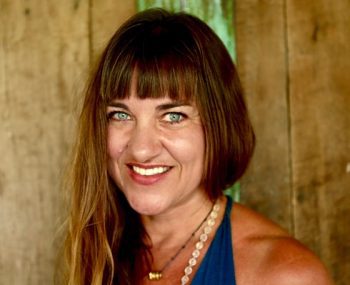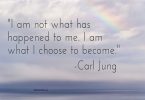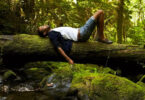Guest writer for Wake Up World
Tomorrow, I go home. Six weeks ago, I arrived in Boston- uncertain. Tomorrow, I leave Boston- once again uncertain but with far less uncertainty than when I arrived. When I came here, the man I was in love with had fourteen parts on one side of his inner IFS conference table that did not want him to be in a relationship with me. He had only one part that did- a 16-year-old boy that craved the affection, connection, and belonging he never got at home.
[pro_ad_display_adzone id=”110028″]
I had come to Boston, tenuous but hopeful, scared but brave enough, guarded but trying to stay open, in the hopes that this one part that wanted to be with me would get a chance to at least try me, without getting bullied and overpowered by all the parts that threatened to sabotage us.
I almost cancelled my trip to Boston days before I went. So many signs pointed towards utter disaster that I wanted to avert feeling so tremulously uncertain. When I was treading treacherously in that fragile place, my terror at losing him made me hair-trigger sensitive to any signals that he didn’t want me. Feeling the fragility of our relationship as I dared to fly to Boston felt like breathing over a toothache. I held my breath, afraid to disturb the exposed nerve underneath.
So when I arrived in his home to find that there was no doorknob on the room where I would be staying, no towel rack in the bathroom, no rod in the closet, no kitchen equipment beyond a stolen plastic hospital plate, no air conditioning when it was 100 degrees outside, and only a paint can by the mattress on the floor for a bedside table, I interpreted it as “He doesn’t want me here.” I fled to Maine to stay with someone who cherished me and wanted me with her.
I had tolerated these same conditions through every Boston season over the course of a year, grateful to be with the man I loved, even if it meant being patient with his need to live a deprived, ascetic life. But imagining six weeks of sweltering heat pushed me over the edge. My parts needed me to take care of them, because it was apparent he wouldn’t.
When I came back five days later, after relishing the cool breezes of a more northern state, eating my fill of lobster, and enjoying the feeling of being wanted, I found a doorknob, a towel rack, a window air conditioning unit, and boxes he had finally started moving in from the basement, where the kitchen treasures had been hiding all along, buried beneath swollen, inflamed memories.
Fast forward to today, and we have built a home together here. And now I have to leave it. The future is once again uncertain. I have a sixteen-year-old junior in high school waiting in California for me. He has a job at Harvard he’s not yet ready to leave. So I will come and go to this Boston life, these new Boston friends, our Boston routine, this forming Boston home where we now have a bed with a headboard we sleep on together and real bedside tables and Le Creuset Dutch ovens and Henkel knives.
Over the past year, we’ve repeated a pattern. We’re really happy when we’re together and we seem to sabotage things when we’re apart. And so now we will be apart, for I’m not sure how long. The panic of uncertainty creeps in again. I can once again feel the tears behind the right on the surface toothache.
And yet, if I comfort these frightened parts, hold them to my breast like a mother soothes a crying baby, I can just barely feel the opening into another way of being. What if this time of uncertainty is not just a terrifying time of not knowing what the future holds? What if it’s also a gateway into the Mystery, a portal of potential, or as he likes to say with his posh, erudite Harvard parts, we are entering the realm of “infinitude.”
Parts of me want to stay in the realm of certainty and finitude, settling the matter once and for all by simply ending it, grieving it, and going back to my single California life. But other parts are so enchanted by what might live in the infinitude- the potential to have my heart really met, the possibility of having met my match intellectually, spiritually, sexually, psychologically, and as an IFS “tor-mentor” who will help me grow into the best version of myself.
Always one to take the AP test or try to get into the hardest universities, I have parts that rarely back down from a challenge. But that’s because I’ve sometimes felt arrogantly over-confident, sure of myself that I could somehow pull it off. My daughter’s father once said that when I say “Just watch me,” he had learned to get out of my way and resist letting his doubting or skeptical parts tell me it wasn’t possible. Because I was going to somehow pull off mission impossible.
Now I feel just the opposite. I have no idea whether what I dream could be possible between me and this man I love is within reach. Sometimes it feels like we’ve been in Katmandu, looking up at Mount Everest, wondering if we really want to try to climb it. We might lose a limb or two. We might fail to summit. We might even die. If we’re going to even try it, we’re going to need good guides, some sherpas, and a village of cheerleaders and allies rooting for us and helping to mend what gets hurt along the way.
Sometimes I’m not sure I want to climb Mount Everest. Just because I’ve rarely backed down from a challenge- and neither has he- doesn’t mean we’ll pull it off this time. In fact, the odds are heavily stacked against us.
Far from feeling over-confident, I feel small, tender-hearted, vulnerable, at risk, afraid of losing the connection we’ve cultivated so carefully and delicately all summer. But I’m also daring to feel hopeful, comforted by the curiosity and excitement of what might lie in the space of the unknown and surrendering to the mystery, trusting in Something Larger that might know more than I do about what’s most right for us both and everyone we touch.
What about you?
How do you deal with the discomfort of not knowing whether something is going to work out the way you hope? What spaces of uncertainty tempt you to create premature certainty by closing the portal of infinitude and locking down the finite? Can you catch yourself when you find yourself inclined to deal with the terror of the unknown by closing down the mystery and nailing down something certain, even if it means sabotaging the very thing you most desire? Have you found practices for comforting your scared parts when they get panicky? Do you have ways of keeping your self-protective instincts from getting in the way of what your heart most preciously and vulnerably yearns for?
The Journey from Fear to Freedom
They say we teach what we need to learn, and here I find myself, seven years after having published The Fear Cure, still resisting uncertainty and still having to remember to let go of my temptation to try to control an uncertain outcome. And so I share what I shared in The Fear Cure- the five phases from fear to freedom.
Phase 1: Unconscious Fear of Uncertainty. I stay in my comfort zone and avoid the unknown at all costs. What I don’t know feels dangerous, but I’m not conscious of how uncomfortable I am with uncertainty. I never get close enough to the unknown to really feel it. I do not act without a sense of certainty about the outcome. I expend a lot of energy avoiding risk.
Phase 1 Motto: “Better safe than sorry.”
How to navigate Phase 1: Start becoming aware of how your inclination to cling to certainty limits your freedom. Ask yourself, “Is this working for me? Is staying in my comfort zone really protecting me?”
Phase 2: Conscious Fear of Uncertainty. What I don’t know feels dangerous, but I’m aware of the fear I feel. Situations of uncertainty provoke feelings of anxiety, worry, and fear in me. This leads me to avoid uncertain situations and to try to control my world. But though I prefer certainty, I’m aware of how clinging to it is holding me back. I resist the unknown, but I realize it’s hard to have adventures if you’re always waiting to be sure of the future.
Phase 2 Motto: “The only thing certain in life is uncertainty.”
How to navigate Phase 2: Be gentle with yourself as you recognize how your drive for certainty limits your possibility. Don’t beat yourself up because you resist uncertainty. Pat yourself on the back for being brave enough to admit it. From a place of radical self-compassion and kindness to your scared parts, you will naturally begin to shift into Phase 3 without bullying or pressuring or otherwise coercing your frightened parts into doing something they’re not yet ready to do.
Phase 3: Uncertainty Limbo. I don’t know whether the unknown is dangerous or not. I’m not entirely at ease with what I don’t know, but I’m not resisting it, either. The unknown doesn’t outright scare me, but I don’t seek it out. I’m starting to sense the freedom that comes with making peace with uncertainty, so I’m willing to be cautiously curious and let my fear of the unknown teach me.
Phase 3 Motto: “I’m curious about the unknown, but I have my reservations.”
How to navigate Phase 3: Question everything but apply critical thinking. Stay open but not so open that your brains fall out. Be curious. Notice the parts that might have an urge to create artificial certainty in order to ease any discomfort you still feel with the unknown. If you seek out too much certainty during this phase, you’re likely to allow your scared parts to create something not quite in alignment with the full realization of what’s possible. Do whatever you can to comfort your scared parts so you can tolerate living in limbo and doing what you can to settle your nervous system and find enough peace to be patient.
Phase 4: Uncertainty Seduction. Not only am I not scared by uncertainty, I’m downright attracted to it. I realize there is more to know and the only way to know it is to lean into the unknown and explore it. To me, the unknown is not scary, it’s somewhat seductive. I’m more in touch with discovering, and with the enlivenment that accompanies the discovery process, than I am with knowing. Discovery is sexier than certainty, and I’m at risk of being reckless as uncertainty seduces me. I’m so willing to entertain the unknown, to step into it and see what’s there, that I don’t always practice discernment. I’m willing to become an adventurer, but I have to remember not to yo-yo to the opposite end of the uncertainty spectrum. There’s a difference between fearless and reckless and this is the phase where recklessness might overtake appropriate caution.
Phase 4 Motto: “The flip side of the fear of uncertainty is the excitement of possibility.”
How to navigate Phase 4: The key to Phase 4 is discernment. When the unknown becomes compelling, it can be tempting to leap blindly, but this can get you in trouble. Someone who experiences no fear in the face of the unknown is potentially at risk of doing something that could harm you or others. Healthy behavior in Phase 4 allows you to approach uncertainty with discriminating decision making, informed by your scared parts but not ruled by them. Instead of reflexively letting fearful parts lead, your Higher Self has more purchase in your system and can lovingly comfort the parts that might be tempted to be reckless, guided not so much by fear, but by the integrity of the soul and the guidance of your intuition.
Phase 5: Surrender. I don’t know, but I trust anyway. I’m not afraid of the unknown, and I’m not seduced by it, either. I’m not bullying my scared parts or pushing them like a drill sergeant to take brave actions, but I’m also not letting fearful or reckless parts take the lead. I practice discernment. I sense that there is an organizing principle I may never fully understand, but I have faith that leaning in the direction of some sort of mysterious order is generally safe as long as I tune in and follow the guidance of the wise aspects of my being. Good things may happen when I lean into the unknown. Bad things may happen, too. But regardless of what happens, I trust that I live in a purposeful universe and that there is meaning in all outcomes. I am simply open to wonder and awe, and I value freedom more than I value certainty, even if things don’t always go my way.
Phase 5 Motto: “The only way to experience life’s richness is to surrender to the unknown.”
How to navigate Phase 5: Enjoy! Phase 5 tends to be very restful to the nervous system, but you don’t usually land there and stay there. Remaining in Phase 5 is a constant practice that Internal Family Systems can help you stabilize over time. If you find yourself slipping back into fear in the face of the unknown, as I did today when I was thinking about leaving Boston, remind yourself to trust that there are unseen forces guiding you in ways you may not understand until you look back.

Originally published at lissarankin.com and reproduced here with permission.
Recommended articles by Lissa Rankin:
- How To Honor Your Desires Without Grasping, Denying or Bypassing
- Pleasure as a Spiritual Path
- The Unmistakable Link Between Unhealed Trauma and Physical Illness
- Satisfying Our Emotional Needs Without Being Codependent
- Relationships on the Spiritual Path
- How to Make Your Body Ripe for Miracles
- Are You “Spiritual But Not Religious?”
- 10 Fun Ways to Reduce Your Cortisol Levels
- 6 Stories To Make You Believe In The Power Of The Mind To Heal You
- 7 Tips For Finding Your Tribe
About the author:
Lissa Rankin, MD is a mind-body medicine physician on a grass roots mission to heal healthcare, while empowering you to heal yourself. She is the founder of the Whole Health Medicine Institute training program for physicians and healthcare providers, and the New York Times bestselling author of the books Mind Over Medicine: Scientific Proof That You Can Heal Yourself (2013), The Fear Cure (2014), and The Anatomy of a Calling (2015).
Lissa blogs at LissaRankin.com and created the online community HealHealthCareNow.com. She is also the author of several other books, a speaker, a professional artist, an amateur ski bum, and an avid hiker. She lives in the San Francisco Bay area.
Connect with Lissa on Facebook and Twitter, or visit LissaRankin.com.
[pro_ad_display_adzone id=”110027″]








